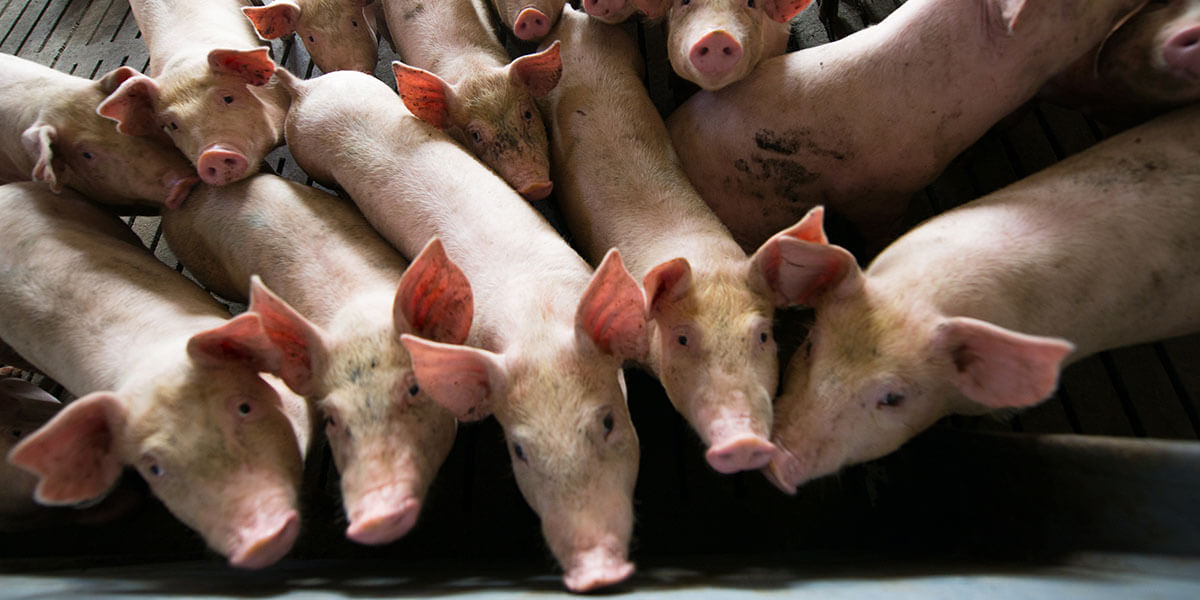Although heat stress in hogs causes hundreds of millions of dollars in losses each year, research on performance trace minerals has helped cool some of producers’ fears.
Lance Baumgard, Ph.D., of Iowa State University, estimates heat stress causes an estimated $900 million per year in swine production and finishing losses. In fact, Baumgard calls heat stress “the greatest threat to efficient animal-protein production worldwide.”
Heat stress is measured using a heat index, a combination of heat and humidity. In swine, the thermo-neutral zone for pigs can range from 64° F (18° C) to 75° F (24° C), depending on the animal’s size, physiological status, air movement and flooring type.
All mammals (including humans) can experience heat stress. However, pigs’ inability to cool themselves via sweating, plus their thick layer of adipose fat tissue and a high percentage of lean muscle mass, makes them especially susceptible to the condition.
Leaky Gut Leads to Inflammation
Swine react to heat by diverting blood from the intestinal tract to the extremities and skin in order to help dissipate heat. In addition, swine will increase respiration rate trying to rid itself of the excess heat from the respiratory process. Blood vessels in the gastrointestinal tract constrict, reducing the oxygen flow to the epithelial cells that line the gastrointestinal tract and try and maintain tight junctions to prevent toxins from passing into bloodstream. When tight junctions between the enterocytes become damaged by oxygen free radicals and a lack of energy due to lower blood flows for the enterocytes can cause the tight junctions to break down allowing the paracellular pathway to allow harmful substances from the lumen of the gut to get into the blood stream. The resulting condition is known as “leaky gut.”
Toxins leaking into the bloodstream cause an inflammatory response that decreases appetite and increases body temperature — two things that can negatively impact a sows’ reproductive system. Heat stress also causes pigs to release more insulin and increases fatty acid breakdown trying to help supply an energy source to the cells of the body. A reduction in feed intake is especially bad for lactating sows, since lactation requires large amounts of energy and nutrients.
Performance Trace Minerals Help With Heat Stress Management
Studies show that effective supplementation of trace minerals can help overcome heat stress in pigs and a decline in performance. Performance trace minerals such as Zinpro® Availa® Zn promote tight junctions between the enterocytes and improve epithelial linings in the digestive tract. Not only does Availa-Zn improve intestinal integrity but also reduces the amount of harmful toxins that get through to the blood system.
Also, there are differences in the inflammatory signals between zinc sources. Availa-Zn improves the increase of lipopolysaccharides binding proteins (actus phase proteins) compared to the zinc sulfate. When inflammation is controlled, appetite remains normal. Blood and nutrients are available for the sow to use for gestation and lactation, rather than for an immune response to the inflammation.
A study conduct by Baumgard at Iowa State University demonstrates that heat-stressed pigs given zinc from Availa-Zn experience superior performance benefits compared to pigs supplemented with zinc sulfate (ZnSO4).
- Heat-stressed gilts had lower body temperatures when fed performance trace minerals
- Feeding performance trace minerals maintained ileal intestinal integrity of pigs (preventing leaky gut) in heat stress conditions
- Markers of muscle catabolism (fat deposits in muscle) in blood were decreased when heat-stressed pigs were supplemented with performance trace minerals
Research also showed a combination of zinc, manganese and copper performance trace minerals bolstered performance in healthy sows compared to other trace mineral formulations.
- Culling rates decreased 15.4% for sows fed performance trace minerals
- Sows fed performance trace minerals utilize more successful nutrient partitioning of feed (improved feed efficiency)
- Milk protein was increased 11.4%, and somatic cell count decreased 43.9% in sows fed performance trace minerals
- Piglets from sows fed performance trace minerals were 2.3% heavier at weaning
Research is clear: Performance trace minerals are an effective tool for heat stress management, which costs producers hundreds of millions of dollars every year. Trace minerals have also been proven to promote overall health in sows and boost their reproductive performance.
To learn more about heat stress and its impact on swine production and performance, contact your Zinpro representative today.

